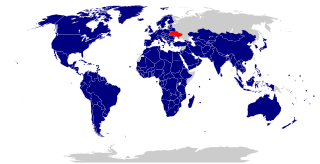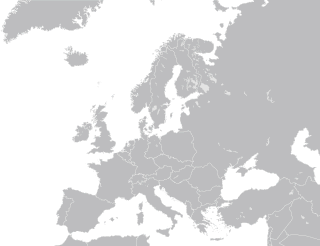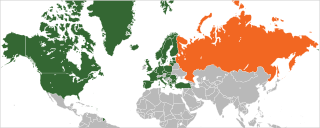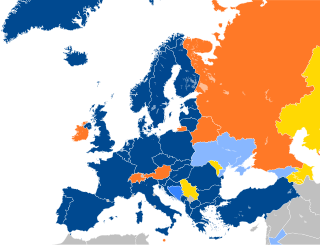Related Research Articles

The North Atlantic Treaty Organization, also called the North Atlantic Alliance, is an intergovernmental military alliance of 32 member states—30 European and 2 North American. Established in the aftermath of World War II, the organization implements the North Atlantic Treaty, signed in Washington, D.C., on 4 April 1949. NATO is a collective security system: its independent member states agree to defend each other against attacks by third parties. During the Cold War, NATO operated as a check on the threat posed by the Soviet Union. The alliance remained in place after the dissolution of the Soviet Union and the Warsaw Pact, and has been involved in military operations in the Balkans, the Middle East, South Asia, and Africa. The organization's motto is animus in consulendo liber. The organization's strategic concepts include deterrence.

The foreign relations of the Russian Federation is the policy arm of the government of Russia which guides its interactions with other nations, their citizens, and foreign organizations. This article covers the foreign policy of the Russian Federation since the dissolution of the Soviet Union in late 1991. At present, Russia has no diplomatic relations with Ukraine due to its ongoing invasion of Ukraine. Other than Ukraine, Russia also has no diplomatic relations with Georgia, Bhutan, Federated States of Micronesia or Solomon Islands.

Ukraine has formal relations with many nations and in recent decades has been establishing diplomatic relations with an expanding circle of nations. The foreign relations of Ukraine are guided by a number of key priorities outlined in the foreign policy of Ukraine.

The Euro-Atlantic Partnership Council (EAPC) is a post–Cold War, North Atlantic Treaty Organization (NATO) institution. The EAPC is a multilateral forum created to improve relations between NATO and non-NATO countries in Europe and Central Asia. States meet to cooperate and discuss political and security issues. It was formed on 29 May 1997 at a Ministers’ meeting held in Sintra, Portugal, as the successor to the North Atlantic Cooperation Council (NACC), which was created in 1991.

World War III, also known as the Third World War, is a hypothetical future global conflict subsequent to World War I (1914–1918) and World War II (1939–1945). It is widely assumed that such a war would involve all of the great powers, like its predecessors, as well as the use of nuclear weapons or other weapons of mass destruction, thus surpassing prior conflicts in geographic scope, devastation, and loss of life.

The Shanghai Cooperation Organisation (SCO) is a Eurasian political, economic, international security and defence organization established by China and Russia in 2001. It is the world's largest regional organization in terms of geographic scope and population, covering approximately 80% of the area of Eurasia and 40% of the world population. As of 2023, its combined GDP based on PPP was around 32% of the world's total.

Jens Stoltenberg, is a Norwegian politician who has been the secretary general of NATO since 2014. A member of the Norwegian Labour Party, he was previously the prime minister of Norway from 2000 to 2001 and again from 2005 until 2013.

Xinhua News Agency, or New China News Agency, is the official state news agency of the People's Republic of China. It is a State Council's ministry-level institution, and was founded in 1931. It is the largest media organ in China.
The Atlantic Council is an American think tank in the field of international affairs, favoring Atlanticism, founded in 1961. It manages sixteen regional centers and functional programs related to international security and global economic prosperity. It is headquartered in Washington, D.C. It is a member of the Atlantic Treaty Association.

John Joseph Mearsheimer is an American political scientist and international relations scholar. He is the R. Wendell Harrison Distinguished Service Professor at the University of Chicago.

Sergey Alexandrovich Karaganov is a Russian political scientist who heads the Council for Foreign and Defense Policy, a security analytical institution founded by Vitaly Shlykov. He is also the dean of the Faculty of World Economy and International Affairs at Moscow's Higher School of Economics. Karaganov was a close associate of Yevgeny Primakov, and has been Presidential Advisor to both Boris Yeltsin and Vladimir Putin. He is considered close to Putin and Sergey Lavrov.

NATO is a military alliance of thirty-two European and North American countries that constitutes a system of collective defense. The process of joining the alliance is governed by Article 10 of the North Atlantic Treaty, which allows for the invitation of "other European States" only and by subsequent agreements. Countries wishing to join must meet certain requirements and complete a multi-step process involving political dialogue and military integration. The accession process is overseen by the North Atlantic Council, NATO's governing body. NATO was formed in 1949 with twelve founding members and has added new members ten times. The first additions were Greece and Turkey in 1952. In May 1955, West Germany joined NATO, which was one of the conditions agreed to as part of the end of the country's occupation by France, the United Kingdom, and the United States, prompting the Soviet Union to form its own collective security alliance later that month. Following the end of the Franco regime, newly democratic Spain chose to join NATO in 1982.

Relations between the NATO military alliance and the Russian Federation were established in 1991 within the framework of the North Atlantic Cooperation Council. In 1994, Russia joined the Partnership for Peace program, and on 27 May 1997, the NATO–Russia Founding Act (NRFA) was signed at the 1997 Paris NATO Summit in France, enabling the creation of the NATO–Russia Permanent Joint Council (NRPJC). Through the early part of 2010s NATO and Russia signed several additional agreements on cooperation. The NRPJC was replaced in 2002 by the NATO-Russia Council (NRC), which was established in an effort to partner on security issues and joint projects together.

China and Russia established diplomatic relations after the dissolution of the Soviet Union in 1991.

The Arctic Policy of the Kingdom of Denmark defines the Kingdom's foreign relations and policies with other Arctic countries, and the Kingdom's strategy for the Arctic on issues occurring within the geographic boundaries of "the Arctic" or related to the Arctic or its peoples. In order to clearly understand the Danish geopolitical importance of the Arctic, it is necessary to mention Denmark's territorial claims in areas beyond its exclusive EEZ in areas around the Faroe Islands and north of Greenland covering parts of the North Pole, which is also claimed by Russia.

NATO maintains foreign relations with many non-member countries across the globe. NATO runs a number of programs which provide a framework for the partnerships between itself and these non-member nations, typically based on that country's location. These include the Euro-Atlantic Partnership Council and the Partnership for Peace.

The ongoing Russo-Ukrainian War began in February 2014. Following Ukraine's Revolution of Dignity, Russia occupied and annexed Crimea from Ukraine and supported pro-Russian separatists fighting the Ukrainian military in the Donbas War. These first eight years of conflict also included naval incidents and cyberwarfare. In February 2022, Russia launched a full-scale invasion of Ukraine and began occupying more of the country, starting the biggest conflict in Europe since World War II. The war has resulted in a refugee crisis and tens of thousands of deaths.
A Second Cold War, Cold War II, or the New Cold War has been used to describe heightened geopolitical tensions in the 21st century between usually, on one side, the United States and, on the other, either China or Russia—the successor state of the Soviet Union, which led the Eastern Bloc during the original Cold War.
There have been several rounds of peace talks to halt the Russian invasion of Ukraine (2022–present) and end the Russo-Ukrainian War (2014–present) in an armistice. The first meeting was held four days after the start of the invasion, on 28 February 2022, in Belarus. It concluded without result, with delegations from both sides returning to their capitals for consultations. A second and third round of talks took place on 3 and 7 March 2022, on the Belarus–Ukraine border, in an undisclosed location in the Gomel region of Belarus. A fourth and fifth round of talks were respectively held on 10 and 14 March in Antalya, Turkey.
References
- 1 2 3 "What is 'indivisible security'? The principle at the heart of Russia's ire against Nato". Financial Times. 7 February 2022. Retrieved 20 August 2022.
- ↑ "Why does Russia focus on 'indivisible security' in Ukraine standoff?". the Guardian. 3 February 2022. Retrieved 20 August 2022.
- ↑ ""Indivisible security" endorsed by international community: Chinese FM-Xinhua". Xinhua News. Retrieved 20 August 2022.
- ↑ Yao, Kevin; Tian, Yew Lun (22 April 2022). "China's Xi proposes 'global security initiative', without giving details". Reuters . Retrieved 13 August 2022.